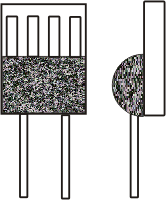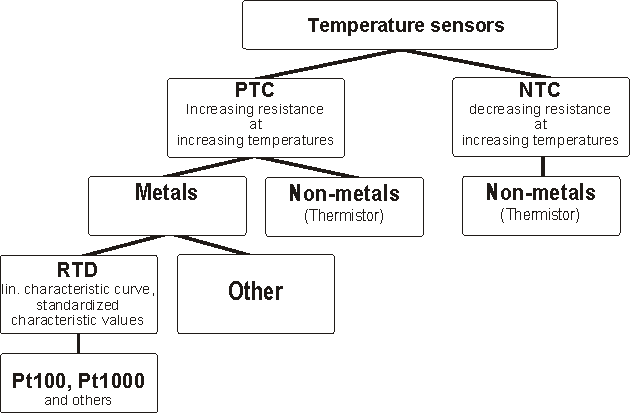Resistance of Pt100 temperature sensors
Pt100 temperature sensors
The name Pt100 is composed of the chemical symbol for platinum (Pt) and the resistance value of 100 ohms specified at 0°C.The Pt100 sensor is based on the principle that the electrical resistance of an electrical conductor changes with a change in changes in temperature.
So actually almost all electrically conductive materials can be used.
For practical use in temperature measurement, however, they must meet certain conditions.

- Long-term stability / low aging
- Chemical resistance
- Usable large resistance change
- Linear change in resistance over the widest possible temperature range
Platinum has a high melting temperature and high chemical resistance, which allows precise measurements, with high stability and accuracy, even under adverse conditions.
PTC temperature sensors (thermistor)
Like all metals, the Pt100 sensor has a temperature-dependent resistance that increases with rising temperature. (PTC = Positive Temperature Coefficient). A useful change in resistance already occurs at low temperatures. PTC is actually a property, but in common parlance it is also used for temperature sensors. In addition to metal PTCs, there are also metal oxide PTCs.These are referred to as thermistors (THERMally-sensitive resISTOR). They are highly non-linear and are often used as switching sensors or for overcurrent protection in electronics.
NTC temperature sensors (thermistor)
In addition to metal temperature sensors, sensors made of a wide variety of metal oxides are also used in mass applications. These often provide a usable change in resistance only at higher temperatures.The resistance decreases when the temperature increases (NTC = Negative Temperature Coefficient).
The advantage of these sensors is the low-cost production and the small design with high response sensitivity.
On the other hand, the lower accuracy, the restricted measuring span, sensor-specific resistance values and a non-linear change in resistance, which make an adaptation of the downstream evaluation electronics necessary.
RTD temperature sensors
RTD is the abbreviation for Resistance Temperature DetectorEach RTD is a PTC that has higher resistance at higher temperatures and the following additional special features:
- Made of metal
- Nearly linear characteristic curve
- Standardized characteristic values (e.g., IEC 60751)

Pt100 Resistance - Resistance values according to DIN EN 60751
The Pt100 resistance is a standardized platinum temperature sensor according to DIN EN 60751 with a nominal resistance of 100 ohms at 0 °C.
The temperature-dependent resistance follows a precisely defined characteristic curve and is determined using standardized
calculation formulas.
Depending on the temperature range from −200 °C to +850 °C, different formulas with the constants A, B, and C are used
to calculate precise and reproducible resistance values in ohms.
With our Pt100 calculator, you can calculate the exact Pt100 resistance in ohms for any temperature.
Please enter a temperature value in °C and press the "Calculate" button.
The right window then displays the resistance in ohms calculated for the Pt100 resistance sensor.
Calculation formulas for Pt100 resistor acc. DIN EN 60751
The Pt100 resistance is calculated in accordance with DIN EN 60751 using different formulas depending on the temperature range.
- Temperature range: -200 to 0°C:
Rt = R0 * (1 + A * t + B * t2 + C * (t-100) * t3) - Temperature range: 0 to 850°C:
Rt = R0 * (1 + A * t + B * t2)
R0=Nominal resistance Pt100 at 0°C = 100 Ohm
t= desired temperature [°C]
A= 3,9083 * 10-3
B= -5,775 * 10-7
C= -4,183 * 10-12
Please note:
The constant "A" for spectrally pure platinum is 3,925*10-3.
As the production of spectrally pure platinum was complex and therefore expensive, the constant "A" was defined as the value for platinum contaminated with other substances.
A further advantage of "defined impurity" platinum is that it is less sensitive to additional external impurities, making the sensor more stable over the long term.
The value of 3,9083 * 10-3 specified in DIN EN IEC 60751:2023-06 is used as the usual value for constant "A".
For high-precision measurements or when recalibrating a Pt temperature sensor, it is important to know which platinum the sensor was made of and which value of constant "A" is used to calculate the temperature.
Especially with older Pt temperature sensors or with Pt sensors manufactured in non-European countries, different platinum based on other standards (DIN 43760-1980, ASTME, JIS, Gost, etc.) is sometimes used. There may be deviations from the values specified in DIN EN IEC 60751:2023-06.
Create Pt100 tables – resistance table calculator
Use our Pt100 Table Generator to create customized resistance tables for Pt
temperature sensors in accordance with DIN EN 60751. Ideal for engineers, laboratories, and
technical staff::
The following settings are available:
- Start and end temperature in the range from −200 °C to +850 °C
- Table subdivision as desired: 1, 2, 5, 10, or 20 °C
- Select temperature sensor: Pt100 or Pt1000
With the Pt100 Table Generator, you can quickly and accurately obtain a complete, customized resistance table in ohms for your temperature measurements
Display Standard tables Resistance Pt100 at different temperatures
Download resistance table and diagram for different temperatures
 Download resistance table Pt100 / °C
Download resistance table Pt100 / °C Download resistance table Pt100 / °F
Download resistance table Pt100 / °F Download Celsius resistance diagram Pt100
Download Celsius resistance diagram Pt100
All technical articles published on pt100.de with attribution were written or reviewed by Harald Peters himself.
Author of this article:
Harald Peters – Technical author for temperature measurement technology
